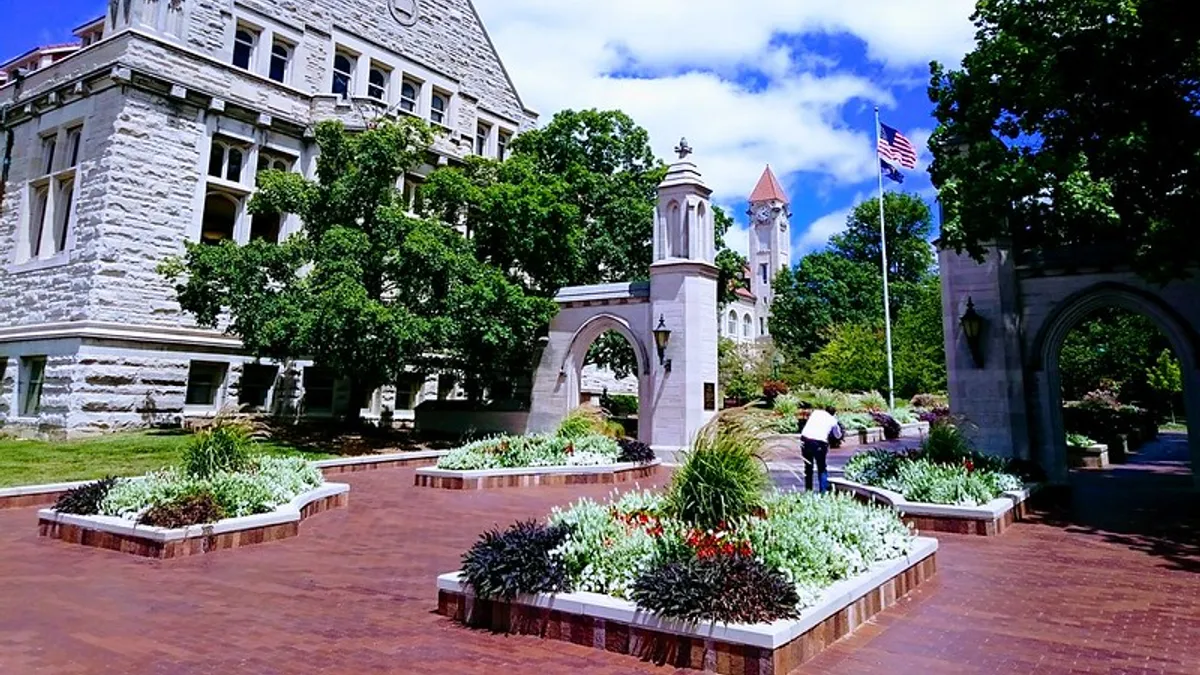Dive Brief:
- The City of Bloomington, IN and the Bloomington Economic Development Corporation (BEDC), among a number of partners, have applied for $5.9 million in federal coronavirus relief funding to develop a technology hub in the city's downtown Trades District.
- The hub would act as a "commercialization center" to complement startup activity and support the existing entrepreneurial ecosystem within the 12-acre District, said Alex Crowley, director of the city's Economic & Sustainable Development Department. The nearly 30,000-square-foot building would host tenant office spaces and convening facilities to encourage startup collaboration, WBIW reports.
- Bloomington is the home of Indiana University (IU), a Big Ten school that hosts nearly 50,000 students and drives heavy tourism to the city year-round. Crowley said the current COVID-19 pandemic has highlighted Bloomington's dependence on its "IU bubble" and the need to expand its economy. "We need to really figure out a way as a city to diversify and invest in growing companies from scratch here, and really make that as strong and dominant of a play that we can in our overall economic development," Crowley said.
Dive Insight:
The coronavirus relief bill, signed into law in March, included $1.5 billion for the Economic Development Administration (EDA) to support communities' economic development projects on a "competitive merit basis." The EDA is providing an 80/20 match to grant recipients. Bloomington's Redevelopment Commission has pledged $1.9 million toward this project, if the city's grant application is selected.
Bloomington is not alone in recognizing its economy's long-term dependence on university activity and tourism amid COVID-19. The pandemic is forcing college towns to face an "economic reckoning," Bloomberg's CityLab reports, as schools limit in-person learning and attendance to sporting events.
"We’ve had a kind of cushy ride on being able to leverage the student and alumni and visitor economy," Crowley said. "The bottom fell out of that in March when everybody left [campus]. It became so obvious how dependent we’d become on that and how that’s really not sustainable, particularly if this thing goes on for a while."
The city's work to promote entrepreneurship didn't start during the pandemic, however. Development on the Trades District, known as a Certified Technology Park (CTP), dates back to 2013 when its first strategic plans were shared. The city officially introduced the District in 2019 following the opening of The Mill, a former factory building that was renovated in 2018 as a nonprofit entrepreneurship and co-working center.
The addition of a commercialization center would allow Bloomington to be "much more prominent in the story of Indiana becoming more tech-oriented," Crowley said. Though Indiana is not often thought of as a home of innovation, cities across the state have been pushing to change that. The City of Fishers, just 20 miles north of Indianapolis, opened the state's first internet of things (IoT) lab in 2018, which reportedly "maxed out" its capacity in its first year due to demand.
As employers shift to more permanent telework capabilities and Americans seek relocation to more affordable living environments, Bloomington has the potential to compete with other up-and-coming towns, Crowley said. It just needs to "assert itself onto a level of visibility."
"If you take a look at how venture investment flows, it’s so concentrated in such a small number of metropolitan areas," he said. "There’s so much other stuff going on, particularly in towns where you have significant research institutions. People tend to overlook areas like that."
Due to the competitiveness of the EDA grant program, Bloomington is "cautiously optimistic" it will receive its requested funding, Crowley said. The city does not have the funds on its own to move forward with its tech hub plan, but he said it would possibly turn to private sector investment if this grant opportunity falls through.













